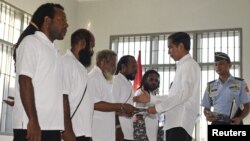Local Papuan officials have applauded the Indonesian government's decision to free five Papuan political prisoners, but some say they remain concerned about human rights in the province.
The head of the Papua traditional governance council, Fadal al Hamid, told VOA on Tuesday that the decision to grant clemency to the prisoners was an act of “goodwill” by President Joko Widodo, widely known as Jokowi.
“We appreciate it as a good intention and goodwill of the government, especially President Jokowi, to see political prisoners in Papua is a matter of concern for them,” he said.
However, Hamid said he continued to have concerns about the seriousness of problems in Papua and the government’s reluctance to find sustainable solutions.
“Political prisoners are being released, but the problems in Papua are not being handled seriously," he said. "Those who are being released today may be rearrested tomorrow. Therefore, what the government is doing now should be [part of a larger process]."
Joram Wambraw, a member of Papua’s People Assembly, told VOA that continued injustice and repression has had an impact on psychological and political relations between Papua and Jakarta.
“To date, the label of separatists has always been there," he said. "The approach toward those labeled separatists is repressive in nature. This, in turn, creates a wider gap psychologically between Papuans and Jakarta. The rebellious attitude toward the republic [of Indonesia] is there because of the injustice itself. For decades since the integration, there has never been peace in Papua. This fractured relationship must be healed.”
During a visit Saturday to Papua, Jokowi said the prisoners’ release was the first step in creating a peaceful Papua.
“This is a wholehearted effort by the government to end the conflict and stigma in Papua," he said. "We want to create a peaceful Papua. We want to persuade everybody [to have a dialogue and build Papua] — those who are in prisons and those who are still in the mountains,” he said, referring to separatists.
Andreas Harsono, an analyst with Human Rights Watch, said he hoped Jokowi would release all Papuan political prisoners in the future. “There are 90 other political prisoners,” Harsono said, “Of course, they must also be freed.”
An armed separatist movement in Papua has been fighting for independence since 1969. Jakarta granted Papua, which occupies the western half of New Guinea island, special autonomy status in 2001, giving local authorities more control over tax revenues. But there has been little improvement in reducing poverty in the resource-rich region.
This report was produced in collaboration with the VOA Indonesian service.




